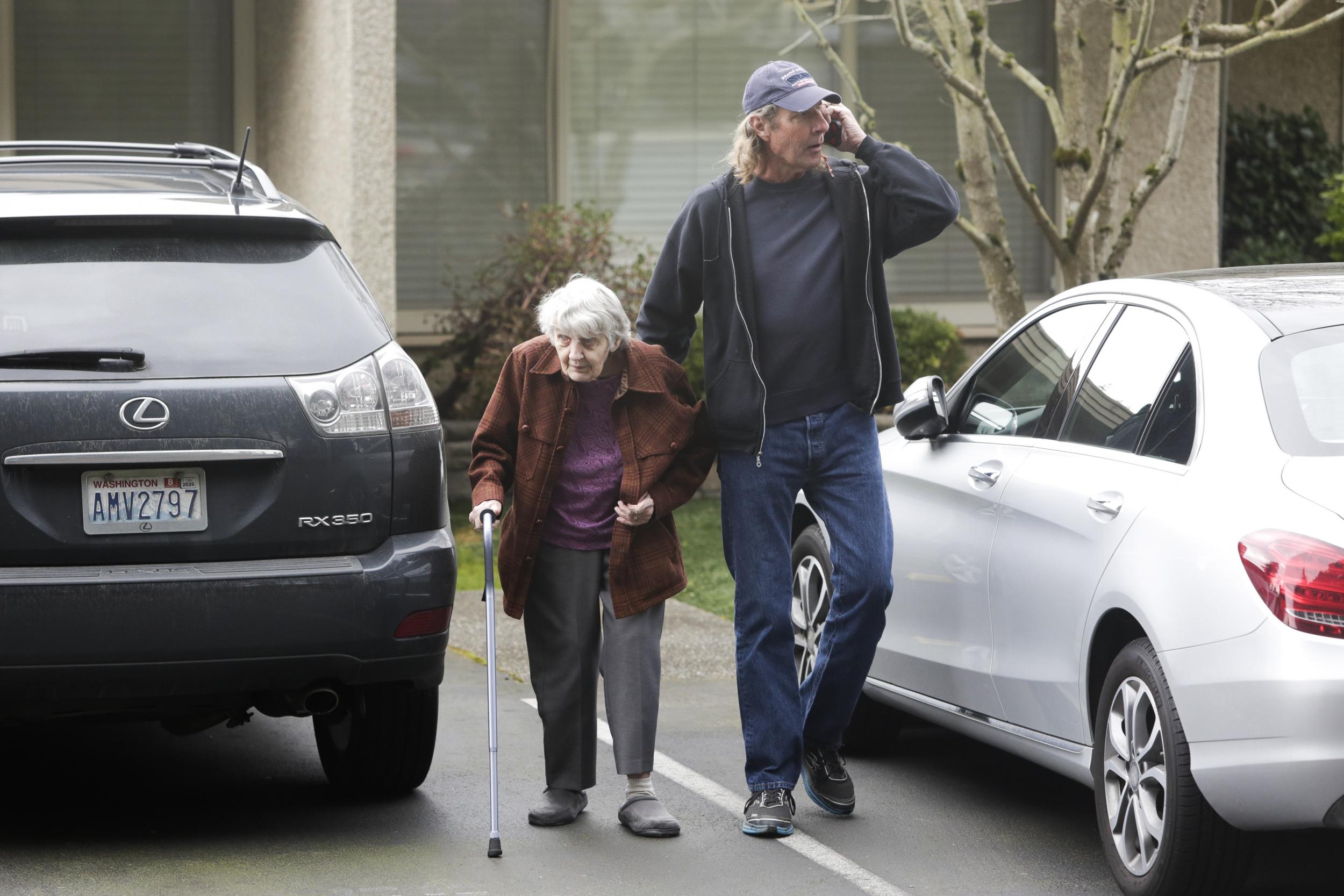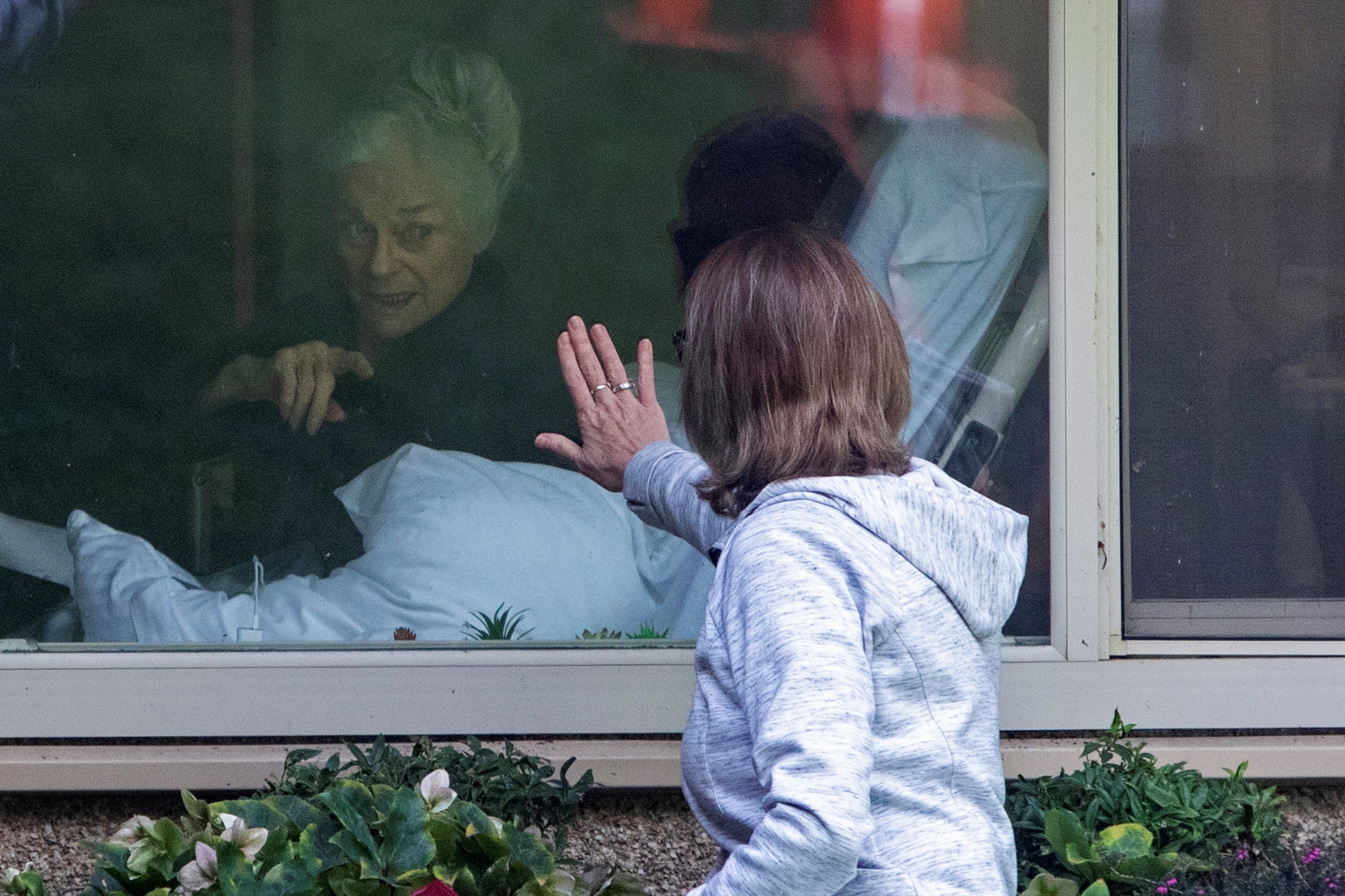‘Russian roulette’: US nursing homes urged to take residents infected by coronavirus
States are increasingly turning to nursing homes to relieve burden on hospitals and take in Covid-19 patients considered stable enough to be released
Your support helps us to tell the story
From reproductive rights to climate change to Big Tech, The Independent is on the ground when the story is developing. Whether it's investigating the financials of Elon Musk's pro-Trump PAC or producing our latest documentary, 'The A Word', which shines a light on the American women fighting for reproductive rights, we know how important it is to parse out the facts from the messaging.
At such a critical moment in US history, we need reporters on the ground. Your donation allows us to keep sending journalists to speak to both sides of the story.
The Independent is trusted by Americans across the entire political spectrum. And unlike many other quality news outlets, we choose not to lock Americans out of our reporting and analysis with paywalls. We believe quality journalism should be available to everyone, paid for by those who can afford it.
Your support makes all the difference.Neal Nibur has lived in a nursing home for about a year, ever since he had a bad bout of pneumonia. Now the 80-year-old man has not only his own health to worry about but that of his neighbours at the Poughkeepsie, New York, residence. Four new patients recently arrived from the hospital with Covid-19.
They were admitted for one reason, according to staff members: A state guideline says nursing homes cannot refuse to take patients from hospitals solely because they have the coronavirus.
“I don’t like them playing Russian roulette with my life,” said Mr Nibur, who is on oxygen. “It’s putting us at risk. I am 80 years old with underlying problems. Everybody here has an underlying problem.”
The disease caused by the virus has killed more than 10,500 residents and staff members at nursing homes and long-term care facilities nationwide, according to a New York Times analysis. That is nearly one-quarter of deaths in the United States from the pandemic. Last Saturday, Gov. Andrew Cuomo of New York described nursing homes as a “feeding frenzy for this virus”.
But states are increasingly turning to nursing homes to relieve the burden on hospitals and take in Covid-19 patients considered stable enough to be released. Although there is no evidence so far that the practice has allowed infections to spread in nursing homes, many residents and advocates fear that it is only a matter of time. One lawsuit in New Jersey alleges that a worker was likely to have been sickened by a Covid-19 patient readmitted from a hospital.
At the epicentre of the outbreak, New York issued a strict new rule last month: Nursing homes must readmit residents sent to hospitals with the coronavirus and accept new patients as long as they are deemed “medically stable”. California and New Jersey have also said that nursing homes should take in such patients. Homes are allowed to turn patients away if they claim they can’t care for them safely — but administrators say they worry that refusing patients could provoke regulatory scrutiny, and advocates say it could result in a loss of revenue.
In contrast to these states, Connecticut and Massachusetts designated certain facilities for Covid-19 patients alone — considered the safest way to free up hospital beds. The Washington Health Care Association, which represents long-term care facilities in Washington state, has asked officials to adopt a similar policy; so far, they have not.
The fears that moving coronavirus patients to nursing homes might spark outbreaks is compounded by the lack of protective equipment at many facilities, as well as shortages in staffing, requiring workers to interact with more patients. And not all hospitals are testing to check whether stable patients are still infectious before releasing them.
In a national survey released on Thursday of almost 9,000 nursing homes, fewer than 10 per cent said they were able to take in new Covid-19 patients from hospitals. The survey was done by CarePort Health, a company that works with hospitals to manage the release of patients to long-term care facilities.

Jay Lawrence, spokesman for the Grand Healthcare System, which has 17 homes in New York, including the one in Poughkeepsie, said the company was doing everything possible to meet state needs and keep residents safe. He said the virus had not spread from those initial four patients in Poughkeepsie to anyone else in the building.
Still, “with Covid being everywhere, it’s a very fluid situation,” he said. “People are trying to be as vigilant as they can. No one knows where and how this is going to rear its ugly head.”
The New Jersey lawsuit, filed on Wednesday against Alaris Health at Hamilton Park in Jersey City by a former nurse, alleges that another employee, a certified nursing assistant, was probably exposed to the virus from a patient readmitted from a hospital.
The assistant was not given protective equipment and not properly isolated while treating the patient, according to the lawsuit. It also said that workers and residents were not told about the patient’s Covid-19 diagnosis. The patient died around on 29 March, the lawsuit said. Cheryl Roberts, the nursing assistant, was put on a ventilator and died on 5 April, said her brother, Darryl Roberts.
“I was devastated because not only did they put my sister in jeopardy, they put the whole facility in jeopardy,” he said.
Matt Stanton, a spokesman for Alaris Health, said workers had proper protective equipment and called the claim that residents got staff members sick “ludicrous”.

Since its original guidance, New Jersey has opted to prohibit admissions to facilities that say they cannot safely care for patients. So far, more than 130 facilities have been exempted.
In New York, the new rule has increased the strain on nursing homes, many of which are now staffed at less than 50 per cent, said Stephen Hanse, president and chief executive officer of the New York State Health Facilities Association and the New York State Center for Assisted Living.
“This puts nursing home providers in a really precarious position,” he said. “If you want to do everything to protect your residents and staff, your hands are tied.”
Asked about admissions of Covid-19 patients in light of nursing home deaths at a briefing Monday, Mr Cuomo seemed unaware of the state rule. “It’s a good question,” he said. “I don’t know.”
Howard Zucker, the state health commissioner, said that nursing homes needed to readmit positive patients and that “necessary precautions will be taken.”
On Thursday, Mr Cuomo reiterated that nursing homes had to accept the patients — but only, he clarified, if they could do so safely. Homes unable to comply should transfer them to other facilities or notify the state Health Department, he said.
The department, responding to questions from The Times, said that nursing homes were not permitted to discriminate against Covid-19 patients but that they should avoid taking patients if not “medically prepared”. Mr Zucker said on Thursday that he did not know of any homes in that position.
Richard Mollot, executive director of the Long Term Care Community Coalition in New York, an advocacy group for residents, said he had heard of several nursing homes that had declined. But the vast majority, he said, have a “tremendous financial incentive” to take in new patients.
Jonathan Jacobson, a Democratic assemblyman whose district includes Poughkeepsie, has urged New York health officials to reverse the directive, calling it “misguided”.
“Nursing homes are simply not equipped to act as hospitals and should not be used as depositories for infected individuals,” he wrote in a letter to health officials last week, adding that patients should instead be sent to facilities designated for Covid-19 patients, separate from large populations of elderly residents.
Although the rule is still in effect, Mr Jacobson said he was heartened by the governor’s remarks Thursday and hoped nursing homes ill-equipped to handle Covid-19 patients would reject them.
Without clear guidelines, patients in hospitals faced the question of where they should go if nobody wants them.
John Stubits, a former civil engineer, was sent by a Michigan memory care centre to a nearby hospital March 30, where he tested positive for the virus. He briefly improved, and the hospital searched for somewhere to discharge him, according to his daughter, Eva Stubits. His previous residence would not accept him unless he tested negative for the infection; no other home in the state would take him.
Ms Stubits said she was told that her father would be sent to a home in Ohio, more than an hour away.
Those plans unravelled when John Stubits became much sicker. Last week, his daughter learned that the hospital planned to send him to a nursing home in Detroit with poor ratings. After many phone calls, Eva Stubits found another home about 30 minutes away from his previous residence.
“The hospitals are desperate to get them out, and they don’t care where they go,” she said. “If you don’t know any better, your relative could end up in a really bad place.”
Despite everything, on Friday, John Stubits died at the nursing home.
The New York Times
Join our commenting forum
Join thought-provoking conversations, follow other Independent readers and see their replies
0Comments